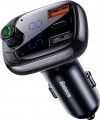AUX (Line-in)
Wired audio input, usually in the form of a standard 3.5mm mini-jack. The
line-in (Aux) input can usually be output from a normal headphone output on a mobile phone or other similar device. And in some models of FM transmitters for linear connection, even their own wire with a 3.5 mm plug can be provided, which eliminates the need to use third-party cables.
Voltage indication
Transmitters that allow you to
display the voltage of the on-board network, so as not to accidentally completely discharge the battery. Or to indicate the corresponding parameter for older cars that do not have such a function.
Max. memory card / flash drive capacity
The maximum size of a memory card or USB-drive (flash drive) supported by the transmitter.
For more information about memory cards and flash drives, see "Cart Reader" and "USB Input", respectively. Here we note that a modern FM transmitter can support two types of media at once; in such cases, the volume limit is often relevant for both flash drives and memory cards, but this nuance does not hurt to further clarify the documentation. Anyway, this limitation is primarily due to the fact that a higher storage capacity requires a more powerful hardware; in addition, there are nuances associated with individual subspecies of memory cards. Anyway, it is impossible to exceed the maximum allowable volume — this can lead to malfunctions and even to hardware breakdowns.
Media support
File formats supported by the FM transmitter.
Almost all models support the MP3 format, which is the most common modern digital audio format. Some devices are also capable of working with WMA — this is also one of the main formats, but for a number of reasons it is used much less often. And even less common is compatibility with WAV — this format provides higher sound quality, but with FM broadcasting this advantage is lost, and the files themselves take up noticeably more space than MP3 and WMA.
Charging port
The transmitter has a specialized
USB port for charging smartphones, tablets and other external devices.
Note that you can also charge external devices from conventional USB connectors; however, specialized ports provide higher power output, which can significantly reduce charging time. It is also worth mentioning that the specific purpose of such a connector can be different: in some models it works only as a power source, in others it can also be used to connect USB drives. Many FM transmitters have two USB ports — regular and charging; this allows you to simultaneously charge an external gadget and listen to music from a USB flash drive. And in modern devices, the old USB A form factor is supplemented by a modern
USB-C port.
Fast charge
The quick charge function, as the name suggests, allows you to significantly reduce the time spent on the procedure. This is achieved through increased current and/or voltage, as well as "smart" process control (at each stage, the current and voltage correspond to the optimal parameters). At the same time, the rechargeable gadget must also have a similar fast charging technology.
24V support
Possibility of operation of the device with automobile networks with a voltage of 24 V.
Such tension is found in heavy equipment — in particular, buses and main tractors (“trucks”). By default, FM transmitters are usually made for the 12-volt on-board networks of cars; therefore, for
installation in a 24-volt network, you need to choose a model where this possibility is directly stated.

